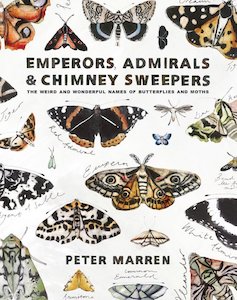 |
by Peter Marren
From the publisher:
The first ever comprehensive book about the naming of British butterflies and moths. This beautiful book, written with Peter Marren's usual wit and insight, takes you on a journey back to a time before the arts and science were divided. When entomologists were also poets and painters, and when a gift for vivid language went hand-in-hand with a deep pre-Darwinian fascination for the emerging natural world.
One of my favourite books is The Scientific Names of the British Lepidoptera: Their History and Meaning, where A. Maitland Emmet explains the scientific names of our Lepidoptera, and so I was delighted to hear that Peter Marren, a well-known natural history author with a fascination for butterfly and moth names, was creating a work that would bring the meaning of both scientific and vernacular names to a broader audience. As Marren writes in the introduction: "we continue to use names from the past without, in so many cases, really understanding them".
Here we have 'two books in one'.
'Book One' (as it is called) provides a thorough grounding in the history of naming which I found to be particularly useful, especially since the names of different species are scattered both in time (when they were first used) and space (the publication in which they were first used). I must admit that I really enjoyed the glimpses into the past and the world that entomologists of yesteryear inhabited and, if you want a good read on the subject, then Marren is the best there is, as readers of a previous work, Rainbow Dust - Three Centuries of Delight in British Butterflies, will attest.
 |
'Book Two', on the other hand, provides numerous examples of names currently in use, organised alphabetically by certain characteristics such as 'Abundance' (where we find Common Blue), 'Witches' (where we find Mother Shipton) and 'Moods' (where we find the genera 'Erebia', the genus of Scotch Argus and Mountain Ringlet, and 'Maniola', the genus of the Meadow Brown). This approach to 'Book Two' has made what could have been a fairly dry read into something much more palatable that can be dipped in and out of. I personally found these characterisations very useful and, to be honest, somewhat thought-provoking as the meaning of each name is revealed. These summaries also describe names used abroad, where relevant.
 |  |
In addition to numerous and often-humorous anecdotes, the book is sprinkled with line drawings and plates, with the occasional photo also included.
All in all, this book has broad appeal, and will be a valuable addition to the bookshelf of anyone that is at all interested in our butterflies and moths. Marren himself sums the book up quite nicely: "knowledge of how and why a species acquired its name can deepen our interest and understanding of these most lovely of insects quite as much as knowing about their caterpillars, or foodplants, or month of appearance."
Highly recommended!
The book is available through all good book stores, from online stores, and also the publisher, Little Toller Books.